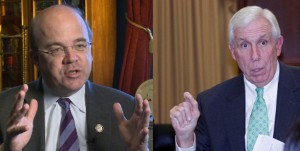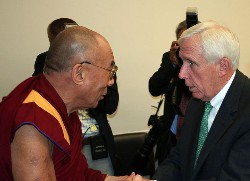As the number of Tibetan self-immolations continues to grow, two US Congressmen have issued an open letter to Secretary of State Hilary Clinton urging her to “undertake stronger, more coordinated, visible, international diplomatic steps to reverse the crisis in Tibet.”
James P. McGovern (D) of Massachusetts and Frank R. Wolf (R) of Virginia issued the letter on August 9th as a means of expressing concern over the humanitarian situation in Tibet and the increasing frequency with which these fiery protests are occurring.
In their joint statement, the two congressmen suggest that the US host an international conference on the issue, perhaps as early as September 2012 at the next UN General Assembly meeting. “We are very aware that US officials regularly discuss Tibet and many other human rights issues with like-minded governments. However, more visible, public, and coordinated diplomacy is necessary for the Chinese government to feel pressure to alter its conduct.”
The letter also proposes that the US hold periodic, public meetings with partner nations to establish a contact group for Tibet, much like the “Friends of Syria” group formed earlier this year to address the growing violence between civilian forces and the Syrian government. The creation of such a coalition would facilitate an international dialogue on the situation in Tibet, bringing it into the spotlight at global forums. It would also allow for multilateral coordination on one of the most sensitive issues individual nations face in their foreign relations with China.
The idea for an international contact group on Tibet is not a new one. In October of 2011, Students for a Free Tibet and the International Tibet Support Network began writing to members of Congress, as well as to parliamentarians from countries around the world, urging them to create a focus group to address the deteriorating situation on the Tibetan plateau. Then, in July 2012, the US State Department issued its annual International Religious Freedom Report, citing China as a nation of “particular concern” and linking repressive government policies to the self-immolations of “at least 12 Tibetans in 2011.”
A subsequent report by the US Congressional-Executive Commission on China, released August 24th, maintained that the increasing wave of self-immolations is “concurrent with increasing Chinese Communist Party and government use of legal measures to repress and control core elements of Tibetan culture, and with the failure of the China-Dalai Lama dialogue process to achieve any sign of progress.”
As August 2012 brought the total count to 50 Tibetans who have set themselves on fire since 2009, Congressmen McGovern and Wolf’s letter and the concern it expresses timely.
“The situation is unambiguously deteriorating and none of these actions comport with the Chinese government’s rhetoric of respect for the rights of ethnic minorities, religious freedom, or a quest for a ‘harmonious society’ in the region,” they asserted. “As the United States continues to ‘pivot’ towards Asia, it is important that the US demonstrate that it is not deaf to the desperate appeals for help and support emanating from Tibetans.”






 Print
Print Email
Email